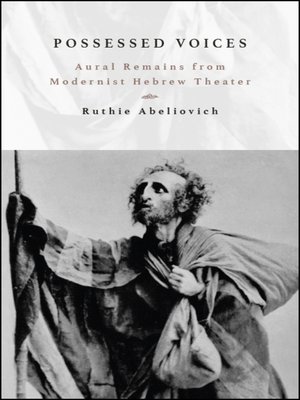Possessed Voices
ebook ∣ Aural Remains from Modernist Hebrew Theater · SUNY series in Contemporary Jewish Literature and Culture
By Ruthie Abeliovich

Sign up to save your library
With an OverDrive account, you can save your favorite libraries for at-a-glance information about availability. Find out more about OverDrive accounts.
Find this title in Libby, the library reading app by OverDrive.



Search for a digital library with this title
Title found at these libraries:
| Loading... |
Finalist for the 2020 Jordan Schnitzer Book Award in the category of Jews and the Arts: Music, Performance, and Visual presented by the Association for Jewish Studies
Possessed Voices tells the intriguing story of a largely unknown collection of audio recordings, which preserve performances of modernist interwar Hebrew plays. Ruthie Abeliovich focuses on four recordings: a 1931 recording of The Eternal Jew (1919/1923), a 1965 recording of The Dybbuk (1922), a 1961 radio play of The Golem (1925), and a 1952 radio play of Yaakov and Rachel (1928). Abeliovich traces the spoken language of modernist Hebrew theater as grounded in multiple modalities of expressive practices, including spoken Hebrew, Jewish liturgical sensibilities supplemented by Yiddish intonation and other vernacular accents, and in relation to prevalent theatrical forms. The book shows how these recorded performances provided Jewish immigrants from Europe with a venue for lamenting the decline of their home communities and for connecting their memories to the present. Analyzing sonic material against the backdrop of its artistic, cultural, and ideological contexts, Abeliovich develops a critical framework for the study of sound as a discipline in its own right in theater scholarship.
Possessed Voices tells the intriguing story of a largely unknown collection of audio recordings, which preserve performances of modernist interwar Hebrew plays. Ruthie Abeliovich focuses on four recordings: a 1931 recording of The Eternal Jew (1919/1923), a 1965 recording of The Dybbuk (1922), a 1961 radio play of The Golem (1925), and a 1952 radio play of Yaakov and Rachel (1928). Abeliovich traces the spoken language of modernist Hebrew theater as grounded in multiple modalities of expressive practices, including spoken Hebrew, Jewish liturgical sensibilities supplemented by Yiddish intonation and other vernacular accents, and in relation to prevalent theatrical forms. The book shows how these recorded performances provided Jewish immigrants from Europe with a venue for lamenting the decline of their home communities and for connecting their memories to the present. Analyzing sonic material against the backdrop of its artistic, cultural, and ideological contexts, Abeliovich develops a critical framework for the study of sound as a discipline in its own right in theater scholarship.






